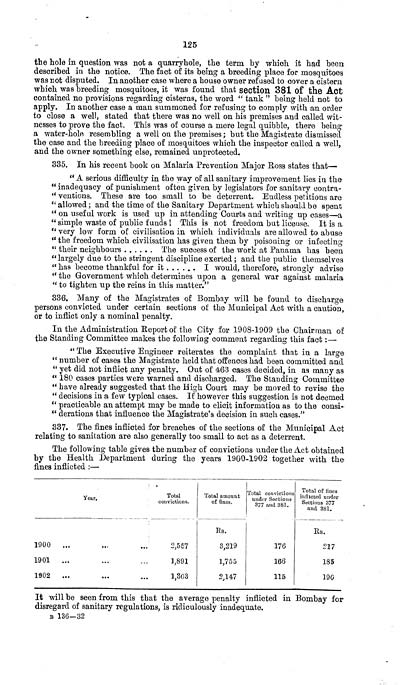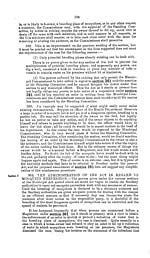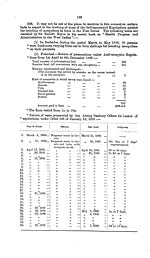Medicine - Disease > Report of an investigation into the causes of malaria in Bombay and the measures necessary for its control
(165) Page 125
Download files
Individual page:
Thumbnail gallery: Grid view | List view

125
the hole in question was not a quarryhole, the term by which it had been
described in the notice. The fact of its being a breeding place for mosquitoes
was not disputed. In another case where a house owner refused to cover a cistern
which was breeding mosquitoes, it was found that section 381 of the Act
contained no provisions regarding cisterns, the word "tank" being held not to
apply. In another case a man summoned for refusing to comply with an order
to close a well, stated that there was no well on his premises and called wit-
nesses to prove the fact. This was of course a mere legal quibble, there being
a water-hole resembling a well on the premises; but the Magistrate dismissed
the case and the breeding place of mosquitoes which the inspector called a well,
and the owner something else, remained unprotected.
335. In his recent book on Malaria Prevention Major Ross states that-
"A serious difficulty in the way of all sanitary improvement lies in the
" inadequacy of punishment often given by legislators for sanitary contra-
"ventions. These are too small to be deterrent. Endless petitions are
"allowed; and the time of the Sanitary Department which should be spent
" on useful work is used up in attending Courts and writing up cases-a
" simple waste of public funds! This is not freedom but liceuse. It is a
" very low form of civilisation in which individuals are allowed to abuse
"the freedom which civilisation has given them by poisoning or infecting
" their neighbours...... The success of the work at Panama has been
"largely due to the stringent discipline exerted; and the public themselves
" has become thankful for it...... I would, therefore, strongly advise
" the Government which determines upon a general war against malaria
" to tighten up the reins in this matter."
336. Many of the Magistrates of Bombay will be found to discharge
persons convicted under certain sections of the Municipal Act with a caution,
or to inflict only a nominal penalty.
In the Administration Report of the City for 1908-1909 the Chairman of
the Standing Committee makes the following comment regarding this fact :-
" The Executive Engineer reiterates the complaint that in a large
" number of cases the Magistrate held that offences had been committed and
" yet did not inflict any penalty. Out of 463 cases decided, in as many as
" 180 cases parties were warned and discharged. The Standing Committee
" have already suggested that the High Court may be moved to revise the
" decisions in a few typical cases. If however this suggestion is not deemed
" practicable an attempt may be made to elicit information as to the consi-
" derations that influence the Magistrate's decision in such cases."
337. The fines inflicted for breaches of the sections of the Municipal Act
relating to sanitation are also generally too small to act as a deterrent.
The following table gives the number of convictions under the Act obtained
by the Health Department during the years 1900-1902 together with the
fines inflicted:-
Year.
Total convictions.
Total amount of fines.
Total convictions under Sections 377 and 381.
Total of fines inflicted under Sections 377 and 381.
Rs.
Rs.
1900 ... ... ...
2,557
3,219
176
217
1901 ... ... ...
1,891
1,755
166
185
1902 ... ... ...
1,303
2,147
115
190
It will be seen from this that the average penalty inflicted in Bombay for
disregard of sanitary regulations, is ridiculously inadequate.
B 136?32
the hole in question was not a quarryhole, the term by which it had been
described in the notice. The fact of its being a breeding place for mosquitoes
was not disputed. In another case where a house owner refused to cover a cistern
which was breeding mosquitoes, it was found that section 381 of the Act
contained no provisions regarding cisterns, the word "tank" being held not to
apply. In another case a man summoned for refusing to comply with an order
to close a well, stated that there was no well on his premises and called wit-
nesses to prove the fact. This was of course a mere legal quibble, there being
a water-hole resembling a well on the premises; but the Magistrate dismissed
the case and the breeding place of mosquitoes which the inspector called a well,
and the owner something else, remained unprotected.
335. In his recent book on Malaria Prevention Major Ross states that-
"A serious difficulty in the way of all sanitary improvement lies in the
" inadequacy of punishment often given by legislators for sanitary contra-
"ventions. These are too small to be deterrent. Endless petitions are
"allowed; and the time of the Sanitary Department which should be spent
" on useful work is used up in attending Courts and writing up cases-a
" simple waste of public funds! This is not freedom but liceuse. It is a
" very low form of civilisation in which individuals are allowed to abuse
"the freedom which civilisation has given them by poisoning or infecting
" their neighbours...... The success of the work at Panama has been
"largely due to the stringent discipline exerted; and the public themselves
" has become thankful for it...... I would, therefore, strongly advise
" the Government which determines upon a general war against malaria
" to tighten up the reins in this matter."
336. Many of the Magistrates of Bombay will be found to discharge
persons convicted under certain sections of the Municipal Act with a caution,
or to inflict only a nominal penalty.
In the Administration Report of the City for 1908-1909 the Chairman of
the Standing Committee makes the following comment regarding this fact :-
" The Executive Engineer reiterates the complaint that in a large
" number of cases the Magistrate held that offences had been committed and
" yet did not inflict any penalty. Out of 463 cases decided, in as many as
" 180 cases parties were warned and discharged. The Standing Committee
" have already suggested that the High Court may be moved to revise the
" decisions in a few typical cases. If however this suggestion is not deemed
" practicable an attempt may be made to elicit information as to the consi-
" derations that influence the Magistrate's decision in such cases."
337. The fines inflicted for breaches of the sections of the Municipal Act
relating to sanitation are also generally too small to act as a deterrent.
The following table gives the number of convictions under the Act obtained
by the Health Department during the years 1900-1902 together with the
fines inflicted:-
Year.
Total convictions.
Total amount of fines.
Total convictions under Sections 377 and 381.
Total of fines inflicted under Sections 377 and 381.
Rs.
Rs.
1900 ... ... ...
2,557
3,219
176
217
1901 ... ... ...
1,891
1,755
166
185
1902 ... ... ...
1,303
2,147
115
190
It will be seen from this that the average penalty inflicted in Bombay for
disregard of sanitary regulations, is ridiculously inadequate.
B 136?32
Set display mode to: Large image | Zoom image | Transcription
Images and transcriptions on this page, including medium image downloads, may be used under the Creative Commons Attribution 4.0 International Licence unless otherwise stated. ![]()
| India Papers > Medicine - Disease > Report of an investigation into the causes of malaria in Bombay and the measures necessary for its control > (165) Page 125 |
|---|
| Permanent URL | https://digital.nls.uk/74573326 |
|---|




